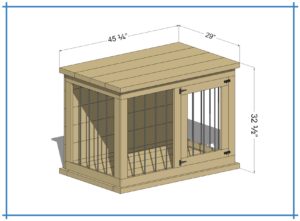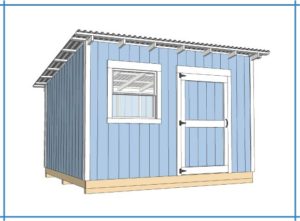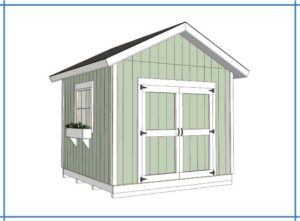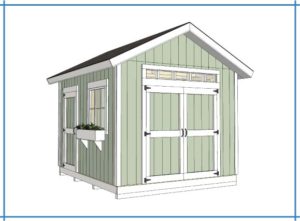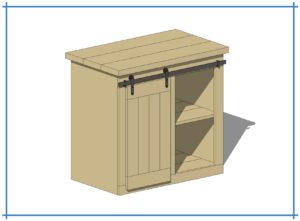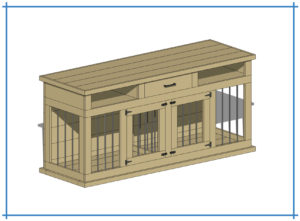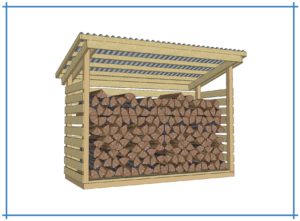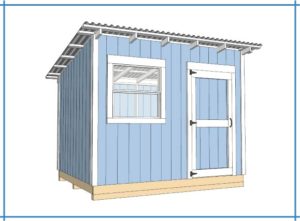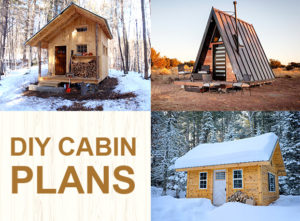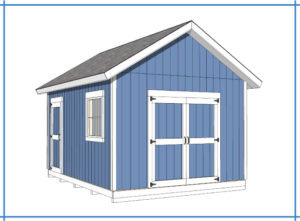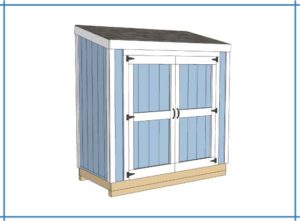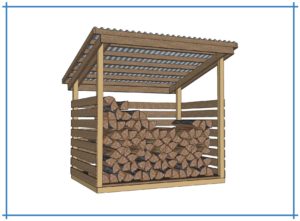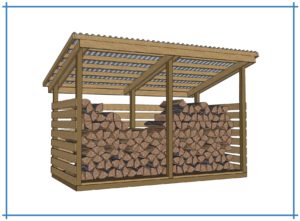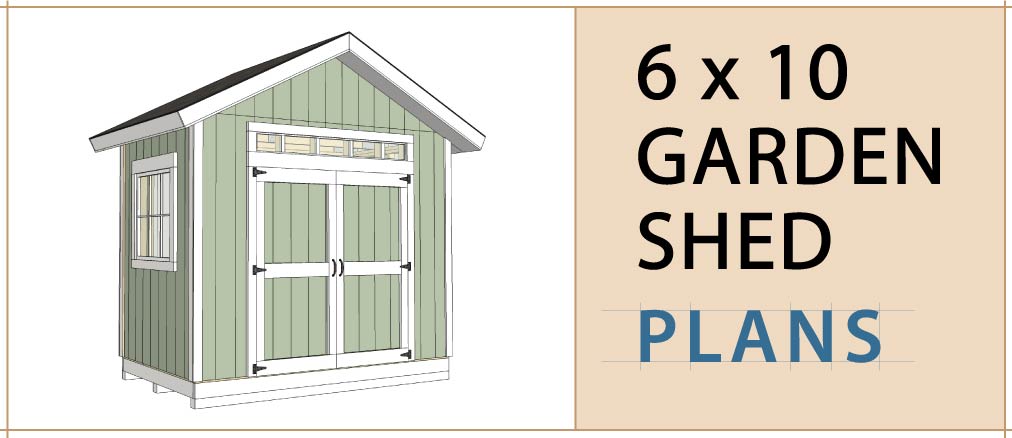
Get the complete 6×10 Garden Shed plans – PDF Instant Download:
PDF includes the cut list, additional diagrams and dimensions, complete step-by-step DIY instructions.
Buy Complete PDF Plan
6×10 Garden Shed Plans | Free DIY Woodworking Guide
Material and Cut List
FLOOR
9 – 2×6 Pressure Treated Lumber: 5′-9″
2 – 2×6 Pressure Treated Lumber: 10′
3 – 4×4 Pressure Treated Lumber: 10′
2 – 23/32″ Tongue and Groove Plywood 4′ x 8′ Sheet (cut to size)
WALLS
38 – 2×4 Lumber: 7′-4 1/2″
2 – 2×4 Lumber: 9′-5 ”
4 – 2×4 Lumber: 10′
2 – 2×4 Lumber: 6′-0″
4 – 2×4 Lumber: 5′-5″
SIDINGS
8 – 4′ x 8′ Plywood Siding Panel T1-11 (240SF)
TRUSS
8 – 2×4 Lumber: 6′-6 1/4″
4 – 2×4 Lumber: 10′
4 – 2×4 Lumber: 2′-2 1/2″
4 – 2×4 Lumber: 2′-6 3/8″
Metal Gusset (reference detail for sizing)
PURLIN & ROOF
10 – 2×4 Lumber: 7′-8″
4 – 4′ x 8′ 1/2″ Plywood Sheet (105SF)
Roof Underlayment (105SF)
3-Tab Roof Shingles (105SF)
ROOF TRIM
4 – 1×6 Lumber: 6′-8 1/8″
2 – 1×6 Lumber: 7′-8″
4 – 1/2″ Plywood: 10 3/8″ x 6-5 3/8″
2 – 1/2″ Plywood: 6′- 3/4″
TRIM
8 – 1×4 Lumber: 7′-9 5/8″
HARDWARE
3 1/2″ Galvanized Steel Nails
2″ Deck Screws
2″ Galvanized Finishing Nails
1 1/2″ Drilling Roofing Screws
DOUBLE DOOR FRAME
2 – 2×4 Lumber: 6′-3 1/2″
6 – 2×4 Lumber: 7 1/2″
2 – 2×6 Lumber: 6′-3″ (door header)
1 – 2×6 Plywood Filler: 6′-3″ (door header)
1 – 2×6 Lumber: 6′-7″ (door trim)
2 – 2×4 Lumber: 6′-5″ (door trim)
DOUBLE DOOR
4 – 2×6 Lumber: 3′
2 – 2×6 Lumber: 2′ 5″
4 – 2×4 Lumber: 5′ 6″
2 – 4′ x 8′ Plywood Siding Panel T1-11: 6′-5 3/4″ x 3′-0″
2 – Door Handle or Latch
6 – 3 1/2 in. x 5/8 in. Door Hinge
WINDOW (optional)
2 – 2×6 Lumber: 3′-2 3/8″ (header)
2 – 2×4 Lumber: 3′-2 3/8″
4 – 2×4 Lumber: 7′-4 1/2″
2 – 2×6 Lumber: 3′-6 3/8″ (window trim)
2 – 2×4 Lumber: 2′-11 1/4″ (window trim)
1 – 35 3/8″ x 35 3/8″ Single Hung Vinyl Window
6×10 Garden Shed Plans & Instructions
Step 1 – Foundation and Floor
Before you pick up any tools, select a proper site for the shed foundation, ideally a flat solid surface away from any large trees or branches.
First, cut nine 2×6 lumbers to 5′-9″ length, and two 2×6 lumbers to 10′-0″. Next, place the three 10′ 4×4 lumbers parallel to each other spaced evenly apart. Then, assemble the four 2×6 perimeter frame on top, this will outline the overall floor frame. Drill pilot holes through the joists and secure with 3 1/2″ screws. Finally, install the seven 2×6 floor joists at 16″ O.C., and 12″ O.C. near the sides.
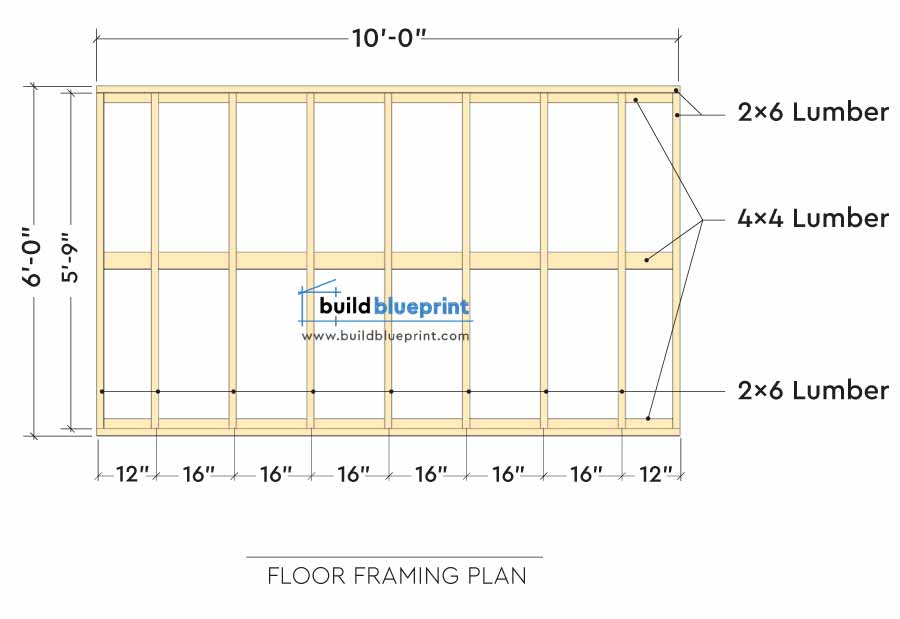
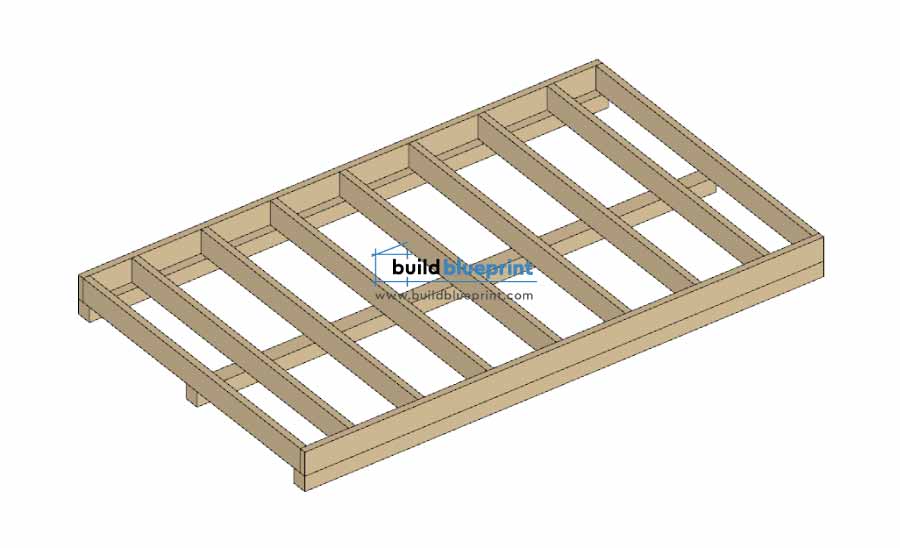
After the floor frame is secured, cut the tongue and groove 23/32″ plywood to size and attach to the frame. You’ll need about 4 sheets to cover the 60SF floor area. These sheets usually come in standard sizes of 48″ x 96″. Insert 2″ deck screws every 8″ along the joint, don’t leave any gaps between the sheets. Refer to the cut pattern and dimensions illustrated below:
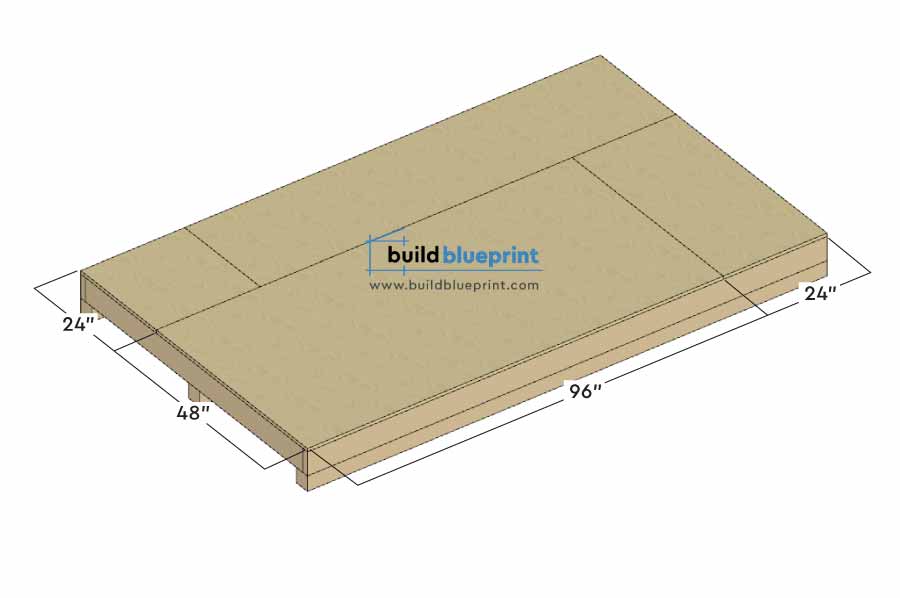
Step 2 – Walls
Start with the front wall frame first, all frames used here are 2×4’s (except the door and window header which are 2×6’s).
Cut two 2×4 to 10′ in length, these will be used for the top and bottom plates. Then, cut eight 2×4 to 7′-4 1/2″ for wall studs, these will be placed 16″ O.C. You’ll also need to cut out a 9′-5″ 2×4 for the double top plate. Drill pilot holes through the plates and insert the 3 1/2″ screws into the studs to secure in place. Align the frame edges and make sure all corners are flush for a professional result.
See detailed Door and Window framing instructions here:
Double Door Plan
Window Plan
The 2 x 4 studs holding up the door header need to be cut at 6′-3 1/2″.
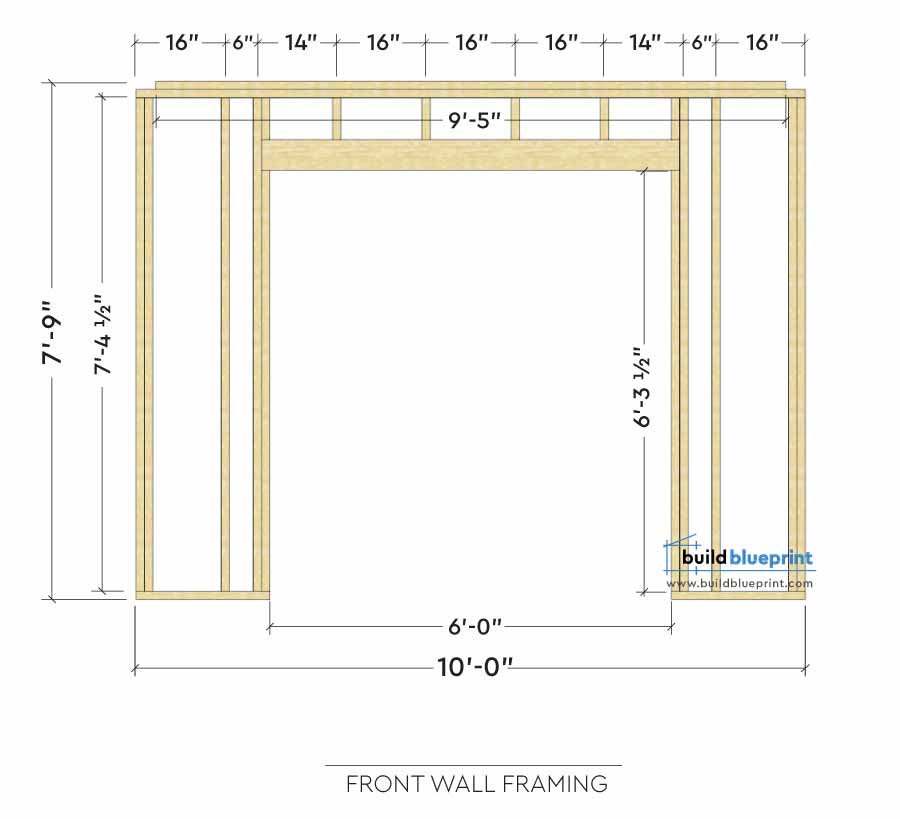
To construct the door header, cut two 2×6 lumber to 6′-3″ length, and insert 1/2″ plywood as filler. Use wood glue and 3 1/2″ nails to secure all the pieces together.
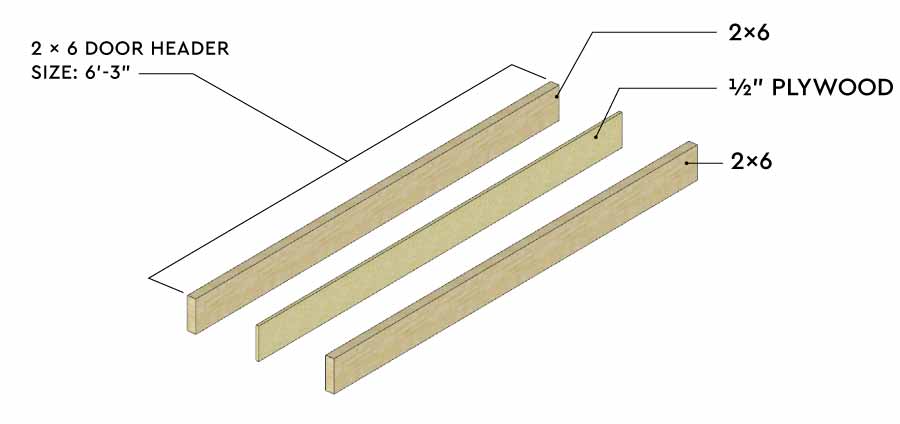
Align the finished front wall frame with the front edge of the floor foundation:
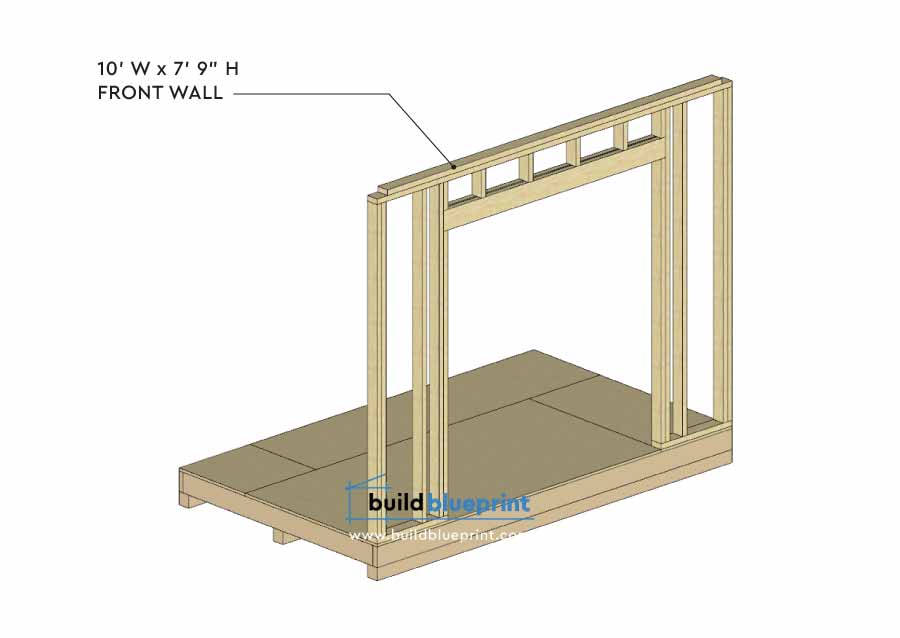
Next up is the building the shed’s back wall. Cut two 2×4’s to 10′ length, and 11 more 2×4’s to 7′-4 1/2″ length. Then cut out a 9′-5″ 2×4 as the double top plate. Follow the framing plan below.
Space the wall studs to 16″ O.C., identical to the front wall. Drill pilot holes through the plate and insert 3 1/2″ screws to secure the studs.
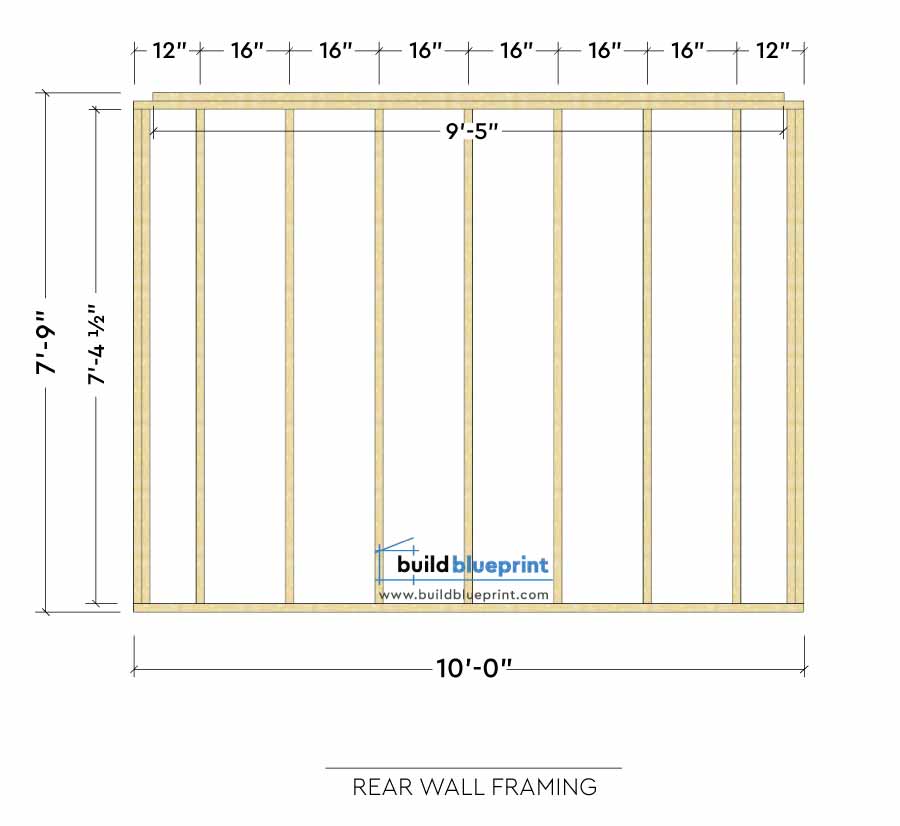
Continue the build by assembling the 2 side wall frames. Cut two 2 x 4’s lumber to 5′-5″ as top and bottom plate, then a full 6′ 2×4 as the double top plate. then cut ten 2×4’s to 7′-4 1/2″ for the wall and window studs.
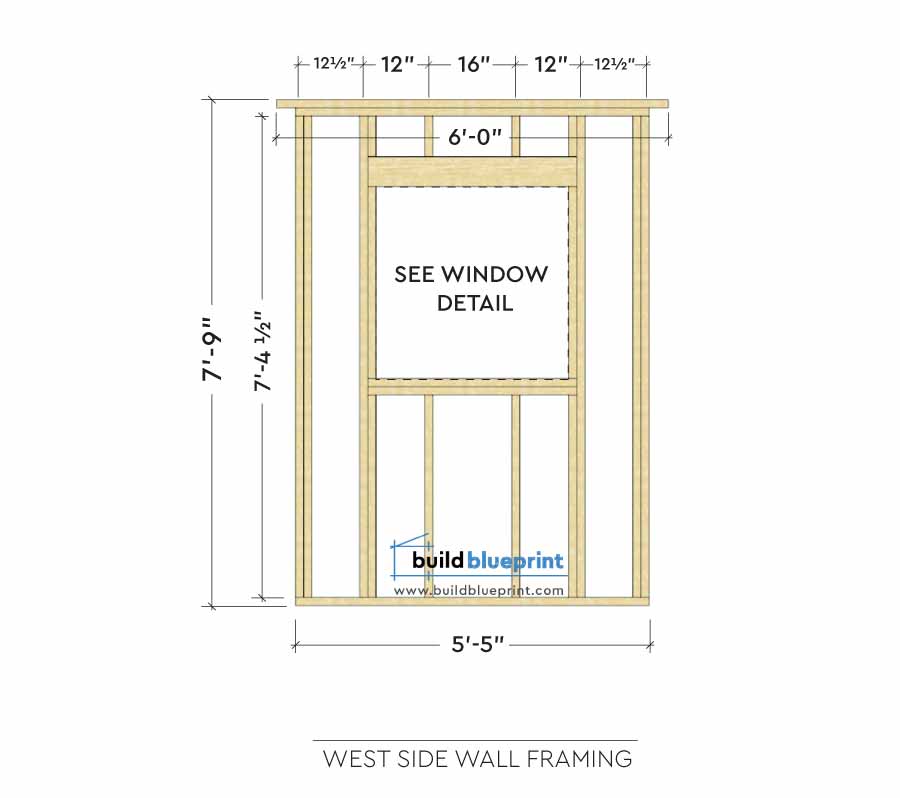
Repeat the same assembly process for the other wall, you can choose to add another window if desired.
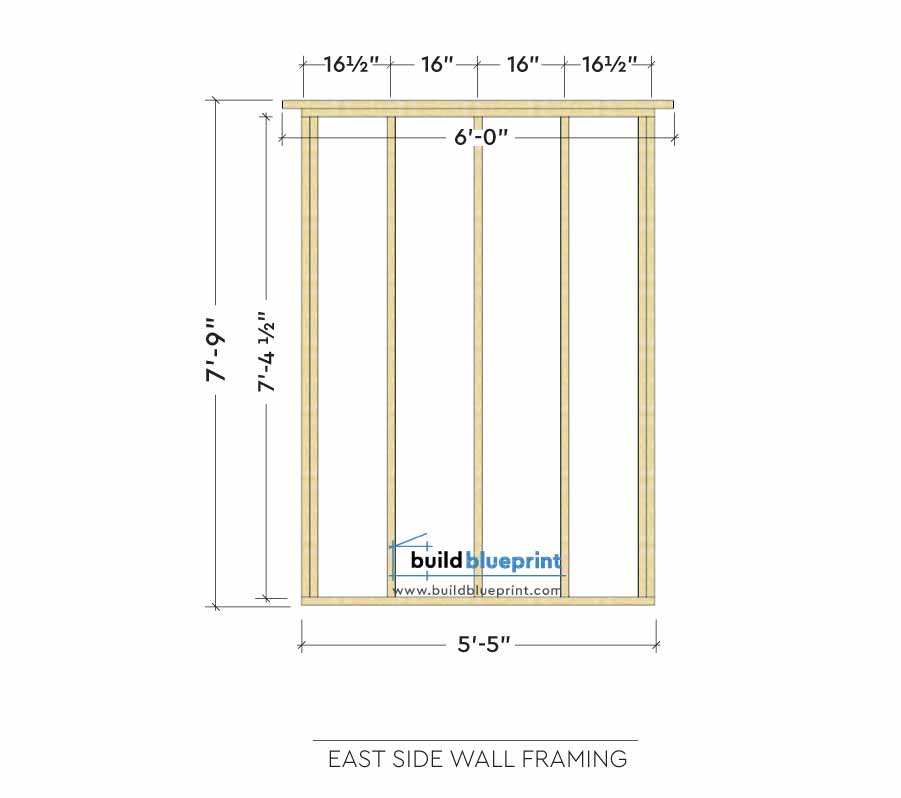
Now it’s time to secure all four wall frames together. First, line up the edges of the front and side wall frame with the floor frame perimeter. Make sure edges line up and there’s no gaps, use a spirit level if needed. Then, drill pilot holes through the bottom wall plate, and insert 3 1/2″ screws to secure wall frame to the floor. After both wall frames are secured, lock the adjacent walls together by inserting 3 1/2″ screws or nails.
Repeat and assemble all 4 wall frames.
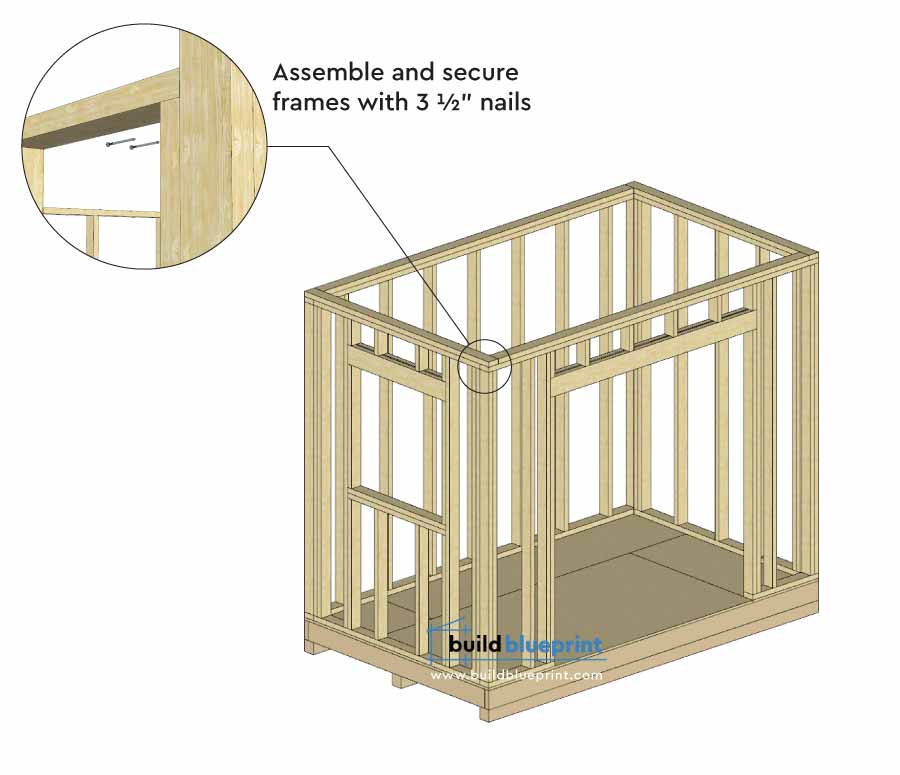
Step 3 – Roof & Truss
The roof will require a total of 4 identical kingpost style trusses, installed 24″ O.C. There are also two cross bracing placed on both ends for added stability. The trusses are designed to have an overhang of 10″ on both sides.
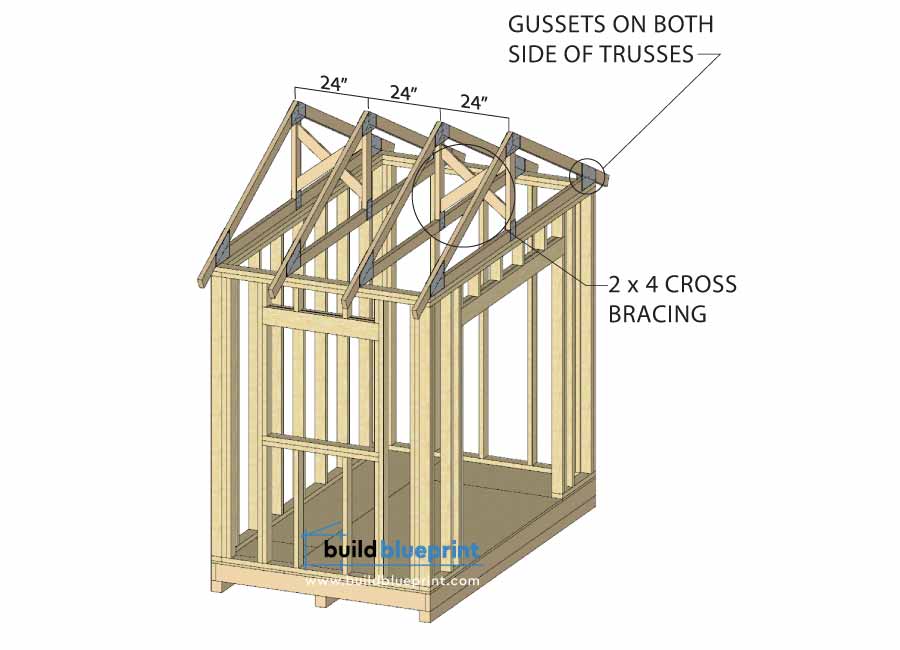
Refer to the truss details below for dimensions and assembly instructions.
Tip: make 1 truss first and make sure everything fits in place.
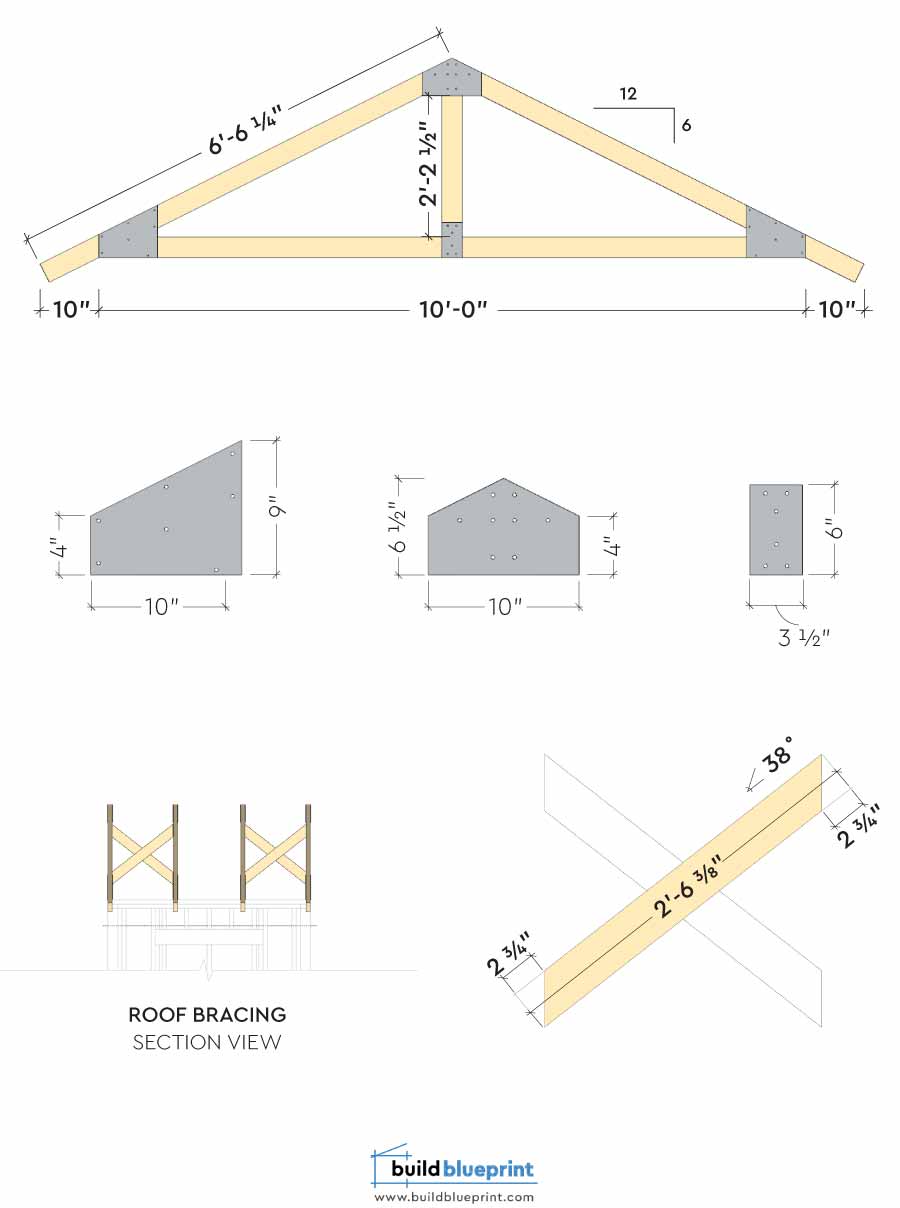
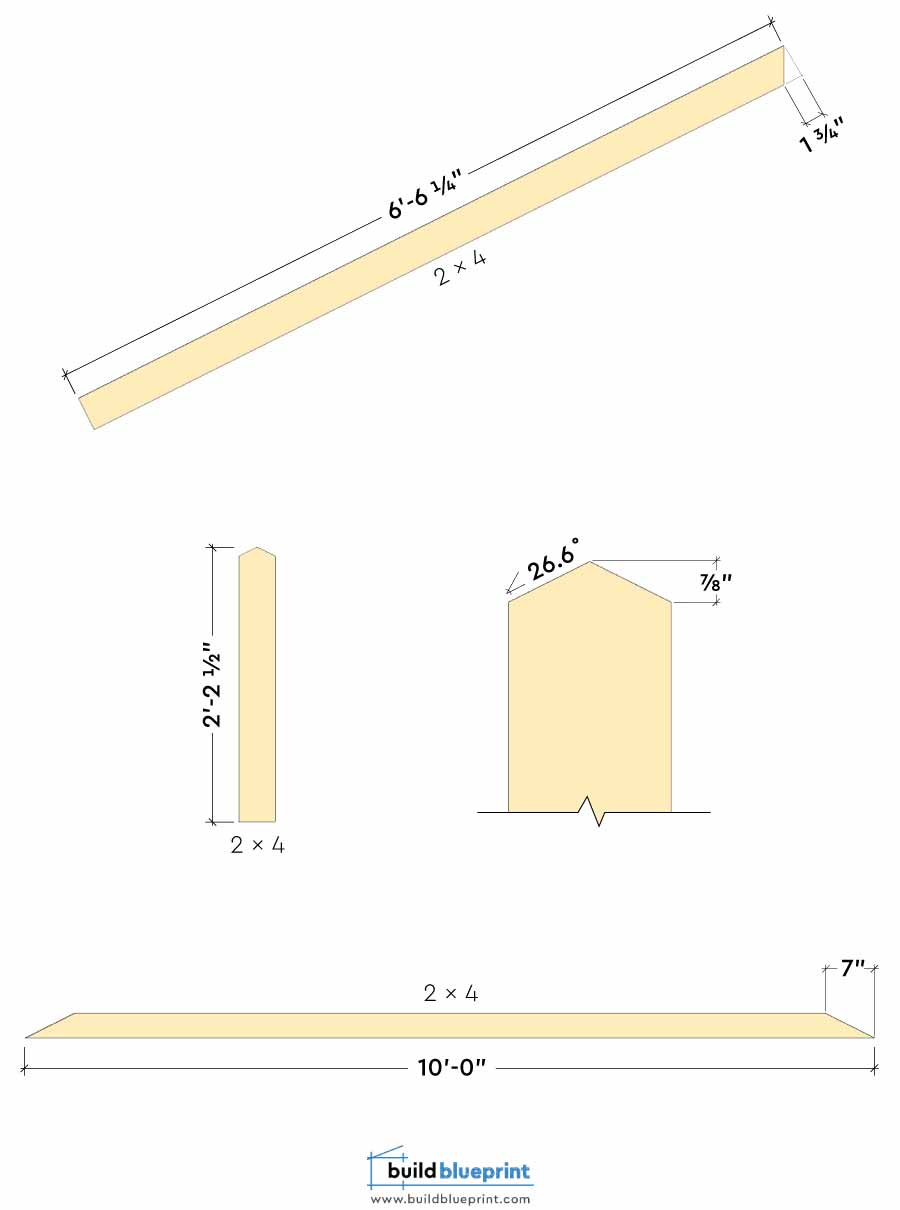
After you’ve finished assembling the trusses, place them 24″ O.C. on top of the wall frames. Then use 3 1/2″ nails to secure each rafter from the underside of the plate. Attach the two set of cross bracing at midpoint of the end truss bays.
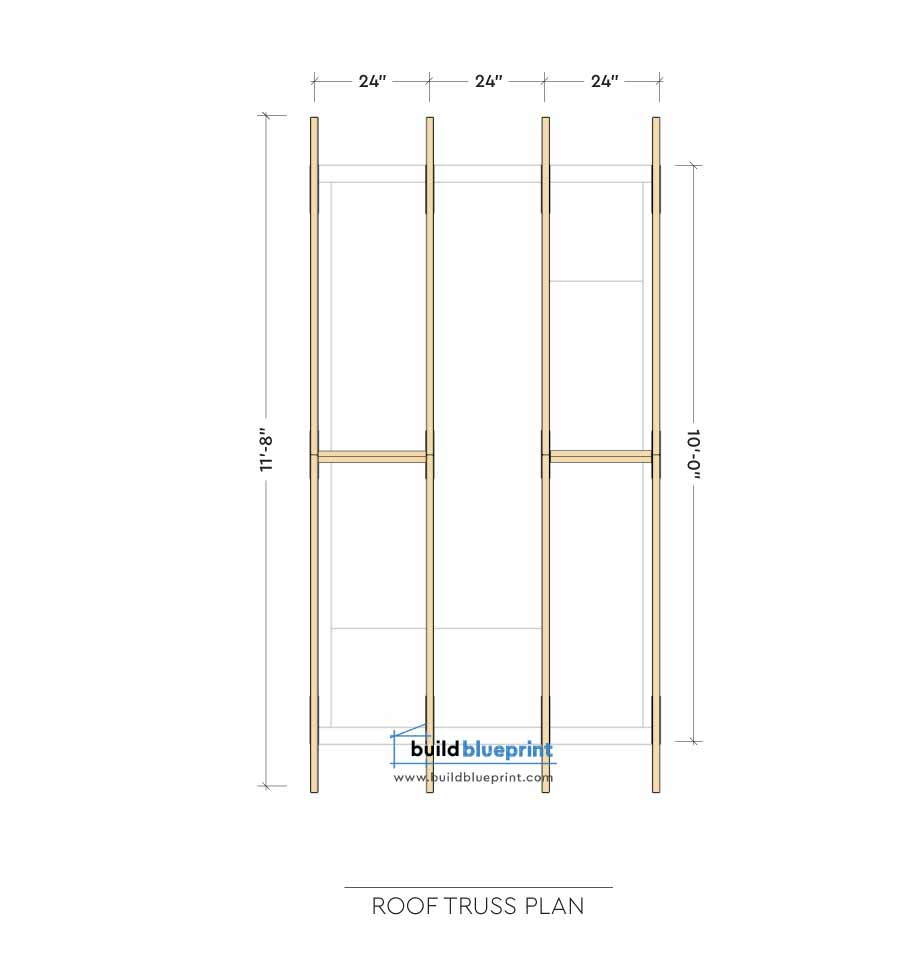
The next step is to add purlins on top of the trusses. Measure and cut out 10 2×4 lumbers to approximately 7′-8″ in length. Center the purlins to leave about 10″ of overhang, secure to the trusses with 3 1/2″ nails.
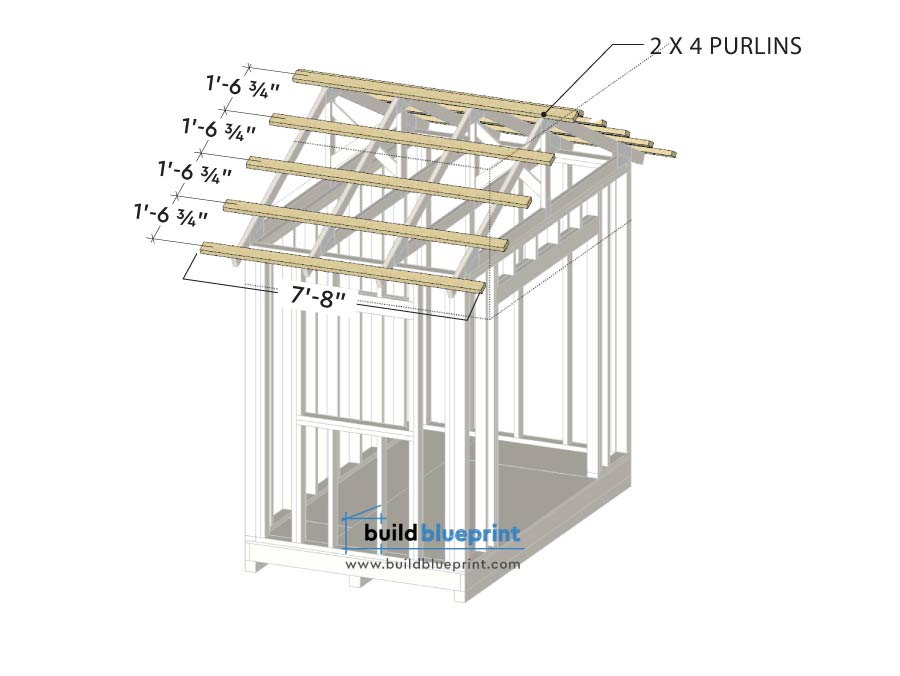
After all the purlins are secured in place, measure and cut the 1/2″ plywood panels to size. These sheets usually come in standard 96″ x 48″ size, you’ll need about 105SF to cover the entire roof area. Insert 2 1/2″ nails into the purlins at about every 10″ to lock the plywood sheets in place.
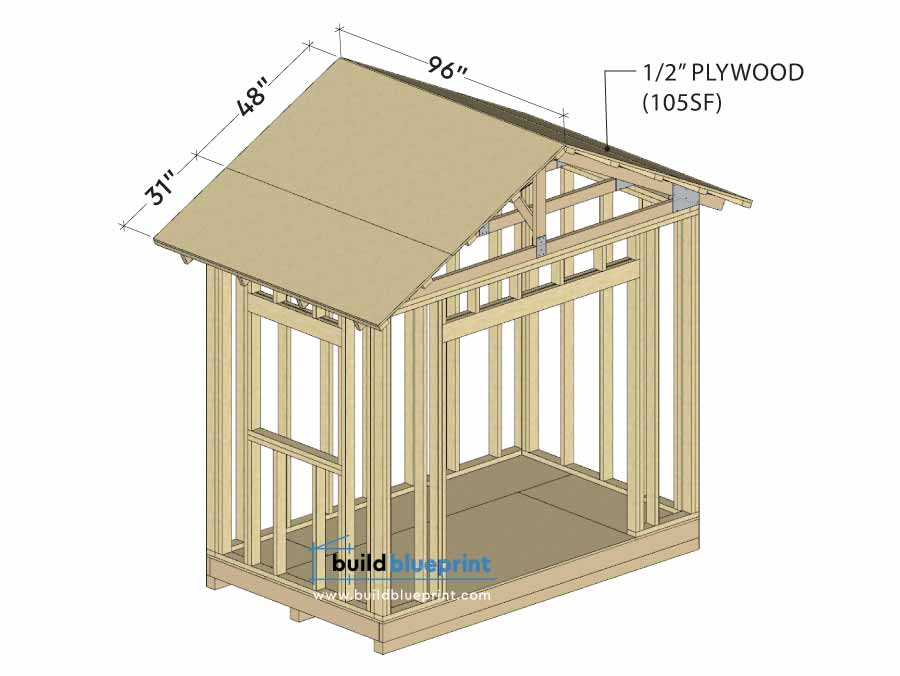
Next up is installing the exterior shed sidings, it’s easier to do this first before adding in the roof trims.
Measure and cut 8 T1-11 plywood siding panels to size. These shed panels are designed to interlock, so plan them out accordingly. These siding panels also come in standard sizes of 96″ x 48″, you’ll need about 240SF to cover the entire shed.
For the front wall siding, measure and cut out the door and window openings before installing. The rough door opening is 72″ x 77″, and the optional window opening is 2′-11 1/4″ x 2′-11 3/8″.
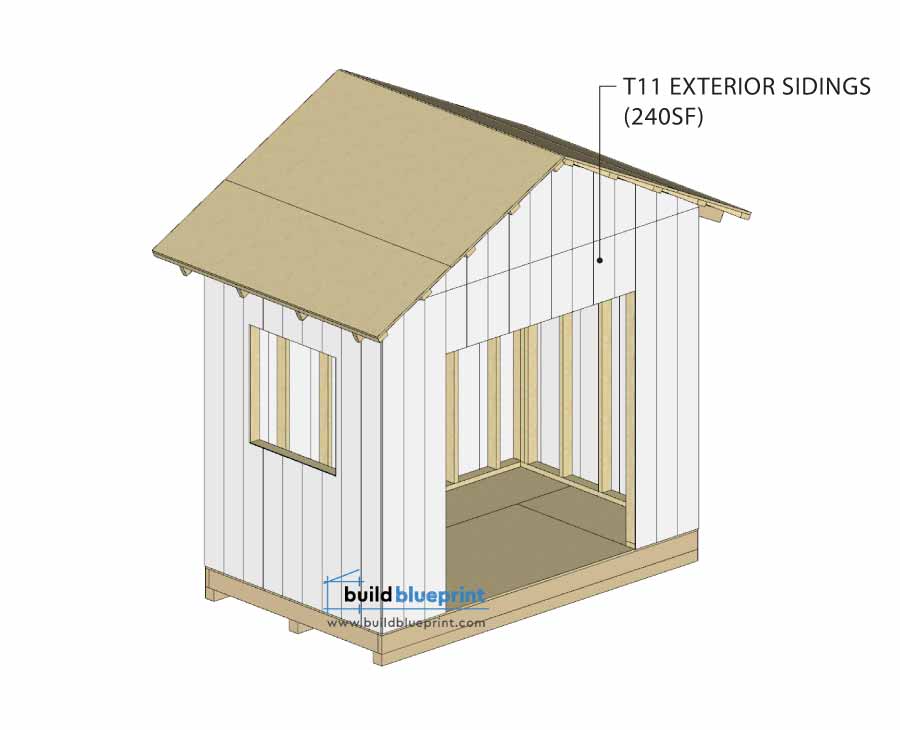
Cover the entire roofing area with roof underlayment or tar paper, this is a water-resistant barrier material to keep the wood structures dry. An 6×10 size shed will need about 105SF to cover the entire roof.
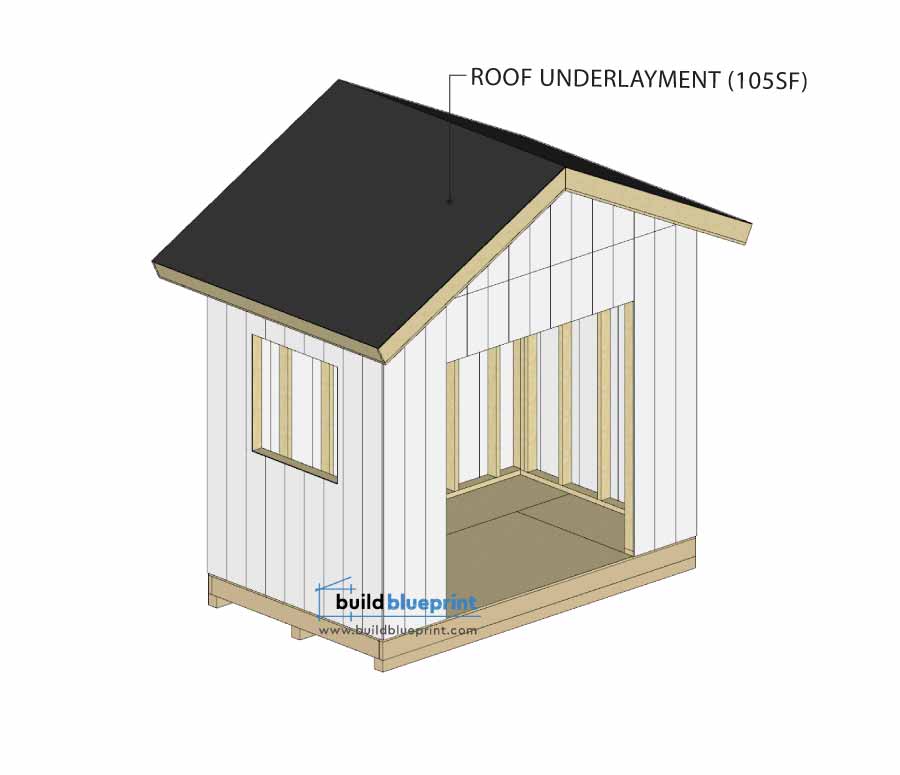
Finally, we need to lay out the roof shingles (105SF of 3-tab roof shingles). Start at the bottom of the roof, measure and mark every increment height all the way to top of the roof. Use glue or glue strip along the rake edge and drip edge. Then, insert 2 1/2″ nails to secure in place.
Tip: You can select the roof shingle material to match the roofing material of the main house, for a unified look! Get samples from your local hardware or home renovation store to get a close match.
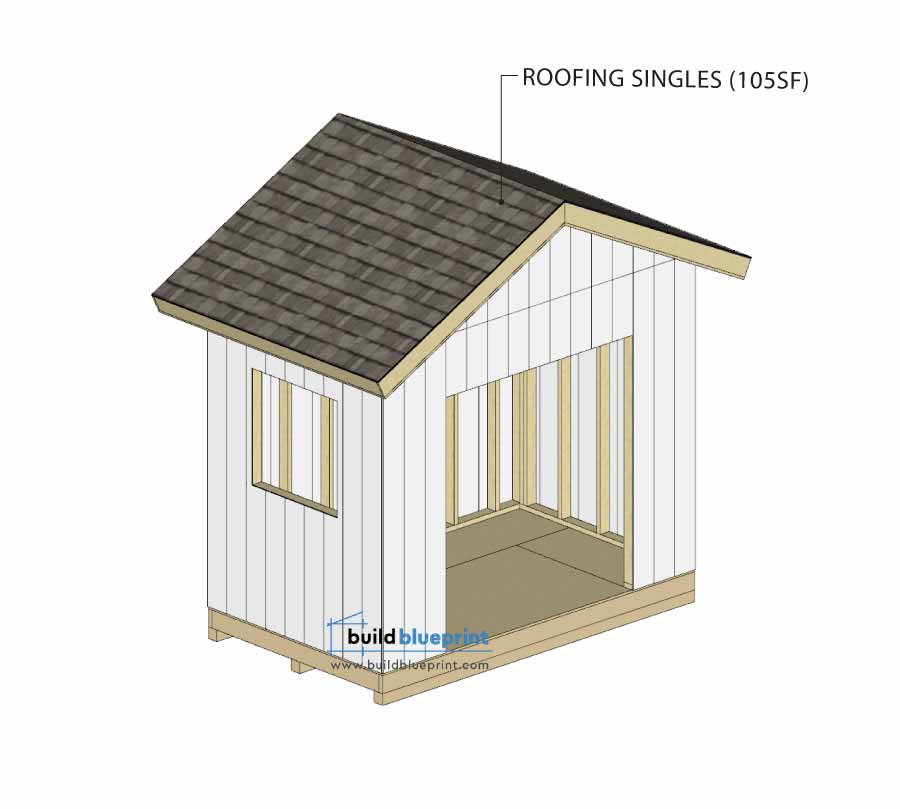
Step 4 – Trims, Door, and Window
For the wall trims, measure and cut eight 1×4 lumbers to 7′-9 3/4″, trim the top angle as needed. Align and secure these trims with 2 1/2″ nails into the wall frames.
As for the door trim: use a 6′-7″ long 2×6 as the header trim, and two 6′-5″ long 2×4’s as frame trims. The window will require a 42 3/8″ 2×6 header, and 35 1/4″ side trims. Secure all trims to the studs with 2 1/2″ nails.
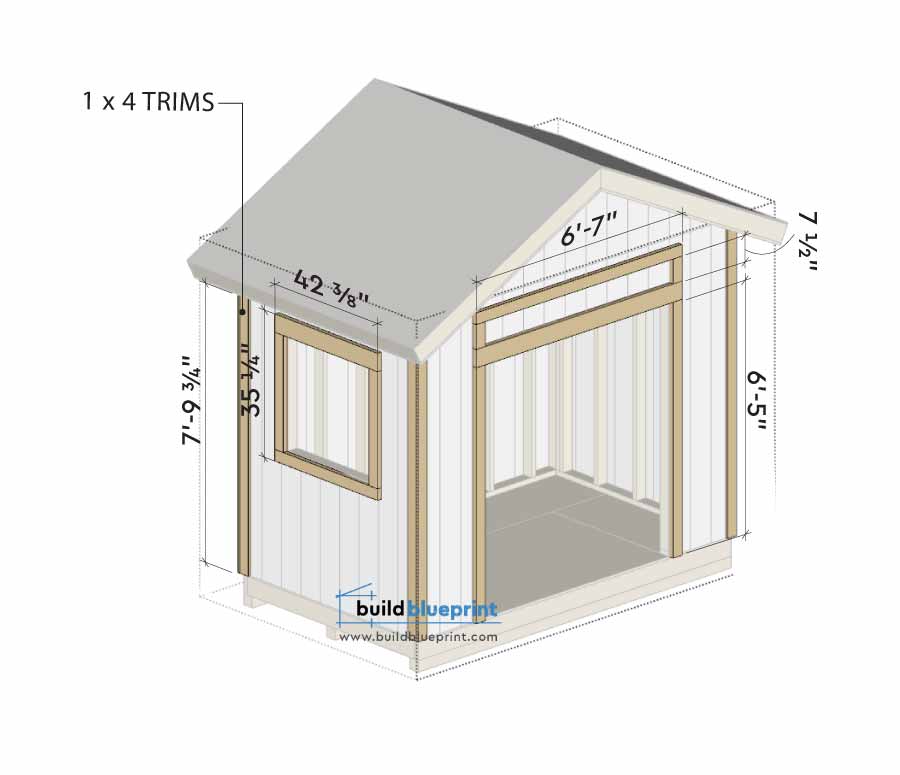
Add in the shed door and optional window. Refer to detailed Door and Window plans here on how to build these:
Double Door Plan
Window Plan
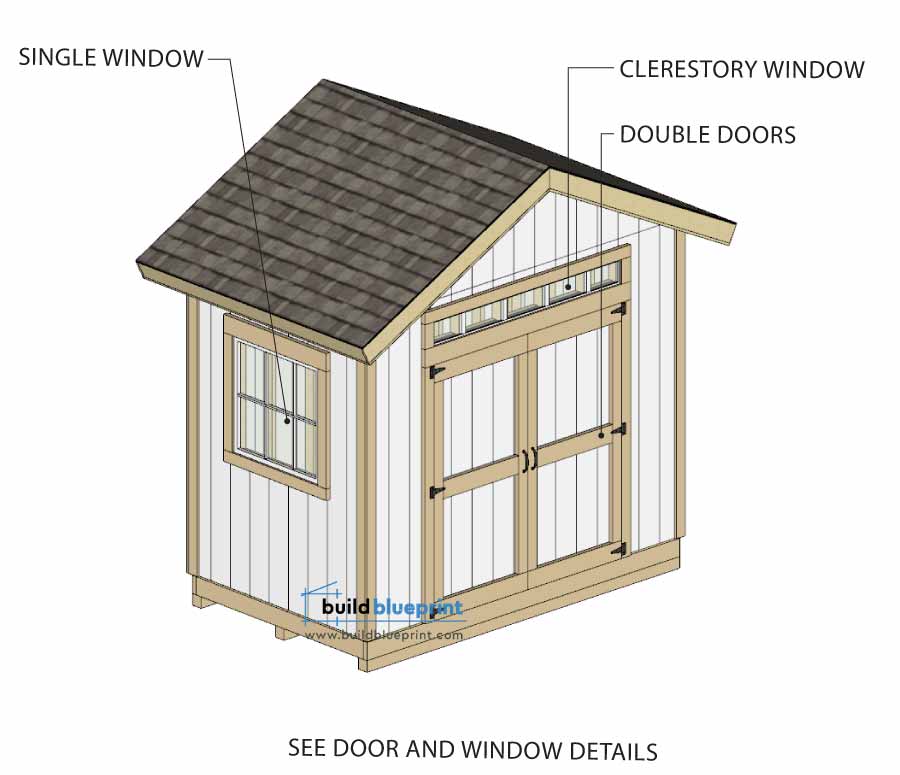
Step 5 – Paint
Your 6×10 Garden style shed is complete! Now it’s time to style it up a little.
First, wipe off any dirt or dusts off the T1-11 siding surface and the trims. Prime the siding with a heavy acrylic primer, a single thorough coat will do the job. It’s best to use a small brush to fill in the grooves and corners first, and then use a larger roller to cover up the flat areas. Let it sit and dry. Then apply two coats of exterior grade acrylic paint, allow 2 hours between coats to completely dry.
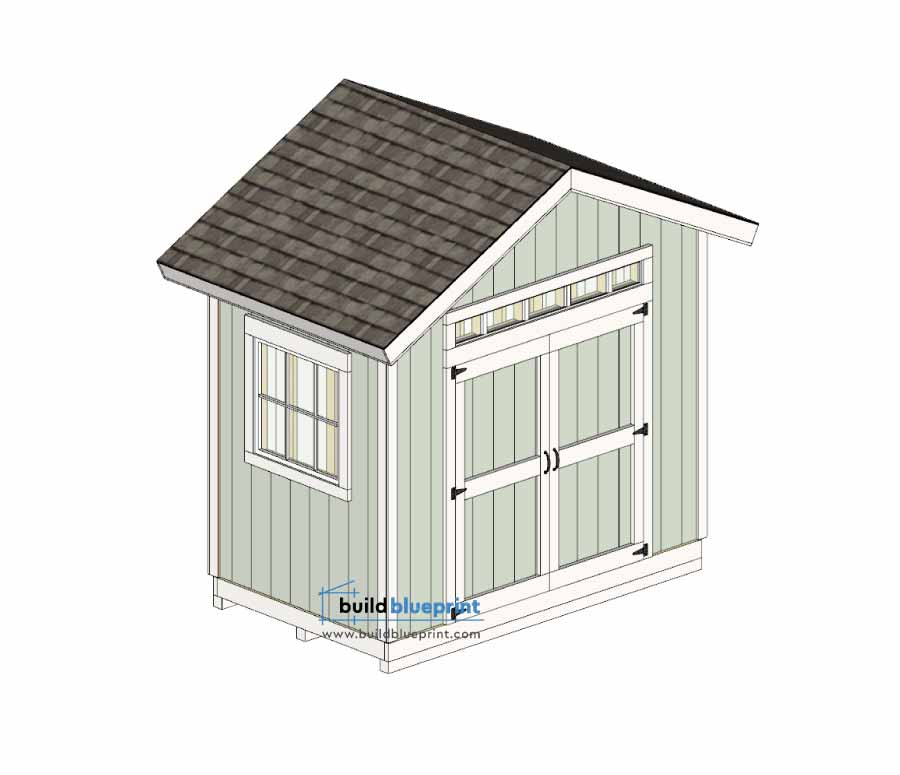
Overall Build Summary
To sum up, garden style sheds is the most pure and traditional form of shed designs. Also, the interior space is versatile, and can be easily transformed into a backyard office, wood workshop, or music studio. The gable style roof is suitable for colder climate regions, strong against rain and snow. This set of 6×10 garden shed plans can be customized to create a number of garden shed variations, get your tools and get creative!

